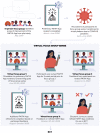Sign of the times: Community engagement to refine a cardiovascular mHealth intervention through a virtual focus group series during the COVID-19 Pandemic
- PMID: 35874864
- PMCID: PMC9297470
- DOI: 10.1177/20552076221110537
Sign of the times: Community engagement to refine a cardiovascular mHealth intervention through a virtual focus group series during the COVID-19 Pandemic
Abstract
Background: African-Americans are underrepresented in mobile health intervention research studies which can perpetuate health inequities and the digital divide. A community-based, user-centered approach to designing mobile health interventions may increase their sociocultural relevance and effectiveness, especially with increased smartphone use during the coronavirus disease 2019 pandemic. We aimed to refine an existing mobile health intervention via a virtual focus group series.
Methods: African-American community members (n = 15) from churches in Minneapolis-St. Paul and Rochester, Minnesota were enrolled in a virtual (via videoconferencing), three-session focus group series over five months to refine a cardiovascular health-focused mobile health application (FAITH! [Fostering African-American Improvement in Total Health!] App). Participants accessed the app via their smartphones and received a Fitbit synced to the app. Participants engaged with multimedia cardiovascular health-focused education modules, a sharing board for social networking, and diet/physical activity self-monitoring. Participant feedback on app features prompted iterative revisions to the FAITH! App. Primary outcomes were app usability (assessed via Health Information Technology Usability Evaluation Scale range: 0-5) and user satisfaction.
Results: Participants (mean age [SD]: 56.9 [12.3] years, 86.7% female) attended a mean 2.8 focus groups (80% attended all sessions). The revised FAITH! App exceeded the goal Health Information Technology Usability Evaluation Scale score threshold of ≥4 (mean: 4.39, range: 3.20-4.95). Participants positively rated updated app content, visual appeal, and use of social incentives to maintain engagement. Increasing user control and refinement of the moderated sharing board were identified as areas for future improvement.
Conclusions: Community-partnered, virtual focus groups can optimize usability and increase participant satisfaction of mobile health lifestyle interventions that aim to promote cardiovascular health in African-Americans.
Keywords: African-Americans; Mobile health lifestyle intervention; cardiovascular health; community–academic partnership; user-centered design.
© The Author(s) 2022.
Conflict of interest statement
Declaration of conflicting interests: The author(s) declared no potential conflicts of interest with respect to the research, authorship, and/or publication of this article.
Figures





References
-
- Haynes N, Cooper LA, Albert MA, et al. At the heart of the matter: unmasking and addressing the toll of COVID-19 on diverse populations. Circulation 2020; 142: 105–107. - PubMed
LinkOut - more resources
Full Text Sources

